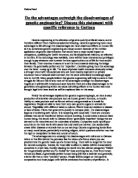Then again, the amazing advances genetic engineering has allowed to happen, in the production of insulin for sufferers of diabetes, goes to show that, if used in the right way, and carefully, it can do something very good.
Then there is the role genetic engineering has to play in food. For example, the potato plant is not very frost resistant. The flounder, a type of flatfish, lives in icy cold waters and so produces special ‘antifreeze’ proteins. Scientists have taken this gene and inserted it into the DNA of the potato, so fewer plants die and the yield of potatoes is increased. But these potatoes are used all over the world in the production of crisps and chips. Does this mean
Nick Collinson
that these products containing the flatfish’s ‘antifreeze’ gene are no longer just potato products, but no longer vegetarian products?
On the plus side, genetic engineering has produced the best tomatoes the world has ever seen. Tomatoes do not stay fresh for long, and so they tend to go off before they are sold. This produces a lot of waste, so genetic engineers found a way of slowing down the ripening process, resulting in better quality tomatoes, less waste, and more time for the producers to get their tomatoes to market.
Another fear is that genetic engineering could lead to the creation of a genetically superior ‘super-race’. The idea of ‘designer babies’ has brought this about; a time in the not so distant future, where parents can choose what they want their offspring to look like, and perhaps even think like. It’s just the same as what Hitler tried to do in the first half of last century.
Except now, there is a new angle: With this new technology, scientists would potentially, have the power to modify the future genetic landscape, in a much more subtle way than Hitler. If this technology was allowed to be developed and ever got into the wrong hands, who knows what could happen, especially in the unstable world we live in now? – It sounds like a recipe for disaster.
Cynthia Cohen, from the Kennedy Institute of Ethics at Georgetown University, Washington D.C. says that we need to make a decision now on whether there is something about human nature that is so valuable we shouldn’t change it. She says that it
is involuntary intrusion into future generations, and there is such a great chance of something going wrong, who knows what the effects of our actions today will be in 2200.
But Gregory Stock, from the University of California, Los Angeles sees it another way. He says we are gaining the power to intervene in a realm we have never had access to… and that we should take this responsibility and move forward.
I agree with this view. I think that what is meant to happen will happen – if we find new technology, then we will use it, it is the
Nick Collinson
way humans work. I also think you can look at it as if genetic engineering is evolving. Evolution is the way of the world, it is the survival of the fittest, and therefore the continuation of a species. So really we are not interfering with nature – we are nature, we are the evolution of recombinant DNA technology.
We should just let what happens happen.
Sources
Moral Dilemmas - Genetic engineering
Read all about it! – Genetics
The revolution in Genetics (Where will biotechnology lead?)
Genetic screening has also been pencilled in, by cynics, as a main pitfall of the future. The question they are posing is, should it be allowed to be used, as a common thing we all have done?
It would provide every individual with a prediction on how long they will live, and how susceptible they are to certain diseases, like cancer or heart disease. The idea is that once people know this information, they will be able to seek treatment proactively and take extra care with their lifestyles. But of course there is the chance that letting out information like that, people will abuse it. Health insurance (in the US, and probably soon in the UK) shares risk between people who never fall ill and people who do. If everyone knows their risk, then people with a low risk may not bother with insurance, and people with a high risk, may not be able to obtain insurance, if they have to declare the results of the screening.







